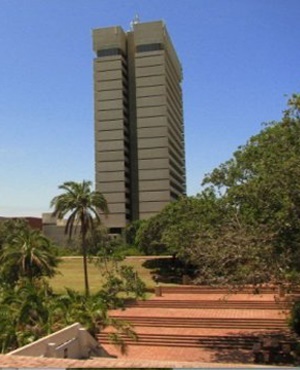
A new name for the university was chosen, a prestigious ocean science campus was unveiled, a new logo was revealed, great speeches were made, red ribbons were cut, babies kissed, it was flowers and roses - we had arrived in the promised land, a new university with values and new angels.
A month later, reality kicked back in. A moron walked into the computer labs of the Second Avenue Campus of Nelson Mandela University (NMU) at night unchecked and in the full glare of CCTV cameras and raped two black female students.
And just like that, an institution imprisoned with demons of mediocrity, black invincibility, white supremacy, racism, classism, and patriarchy remained intact.
This prompted student protests at the university that whole week in demand for the removal of senior security staff and the strengthening of security detail in the campus. This was a commendable action by students as it showed that their social consciousness and a sense of solidarity has been enhanced over the past two years.
They proved to be concerned about the plight of another person, a value of collectiveness in an environment that is administratively and academically imbedded on individualism. But this episode proved that universities are a site of rape and this so-called Nelson Mandela University (NMU) is no different.
To give context, black students enrolled in NMU come from the disadvantaged communities of the Eastern Cape and are subsidised by state bursaries and loans from NSFAS to study. Over 90% of students registered at the university stay off-campus due to the shortage of on-campus beds caused by the unpreparedness of this former white minority institution to accommodate the progressive post-1994 enrolments.
For basic student livelihood necessities such as transport, laptops, food, information, toiletries, clothing, and textbooks, black students are at the mercy of NSFAS, government and the university to provide them.
Therefore, having black female students specifically, studying in a computer lab at night is not a surprise when NSFAS and the university fail to provide laptops on time with printing material and Wi-Fi in the comfort of student’s rooms, be it on or off-campus.
In addition, whilst there has been an unprecedented increase in the enrolments of poor black students, the administration culture of the university is still orientated towards the provision of higher education to male, white, and middle-income students.
For instance, security is heavily deployed to the daylight guidance and detail of vehicles, buildings, conferences, and events; features associated and prioritised by middle-income, white, and male students and staff.
There is less security deployment towards the guidance and detail of human beings, be it at night or daylight, walking, studying in libraries and labs using of public transport; which are things associated with poor, black, and female students.
If I had more space, I could make many other examples from many university departments who subconsciously provide racist and classist administration that is felt gravely by black, female and poor students.
This demonstrates that the student profile of the university has drastically changed whilst the middle management profile has remained the same. The new generation of students is still under the mediocre control of the old Afrikaans bureaucratic administration that does not have a culture of caring whatsoever.
Hence, the call by students for the immediate removal of the Director of Protection Services is completely valid but totally misinterpreted and philosophically misunderstood by the racist old guard in the university.
The ever-increasing number of black students’ enrolments in universities is driven by the perception that apartheid minority rule led to the humiliating proletarianisation of the black family and, therefore, a university qualification is an exit path to employment, comfort, and an improved standard of living. This is at the centre of what makes universities in South Africa become publicly reliable and legitimate institutions worthy of heavy investment by families, business, and government.
Furthermore, they are one of the biggest employers in the economy and, therefore, with the Eastern Cape as a poor province having four of such institutions (Rhodes, Fort Hare, Walter Sisulu and Nelson Mandela universities) shows that the destiny of millions of Eastern Cape families is heavily depended on these universities.
Therefore, anything and everything associated with terminating the success and existence of black female students, such as rape, should immediately compel stakeholders to take action.
As Professor Pumla Gqola puts it, rape is violence. Rape is violence because it is intended to hurt, damage, dehumanise and kill someone.
When something happens in a university, it is likely to remain within the walls of the university. Nobody gets to be held accountable by the broader public for sexual harassment or for being a racist. It is only when the university launches an ocean campus and reveals its new logo that the public is invited. Otherwise, all forms of abuse and injustice threaten its “reputation”. What happens in Vegas stays in Vegas.
Lastly, the institutional culture ruthlessly celebrates rape culture. One would find events organised by the university and liquor businesses in student cities endorsing events with promotions such as “First 100 Ladies Get Free Entrance and Drinks”.
Symbols of this nature advance the narrative that the purpose of women is to liquidate their senses with alcohol for the unconsent entertainment of men. The future lawyers, psychologists, scientists, and business professionals trained in a university with this institutional cultural grow up to know that the purpose of female bodies is to satisfy men sexually. Sexual violence becomes a lifestyle.
Whilst the rapist is arrested and facing trial, the most painful reality from this point is that female students of NMU must always be on the lookout for rape and they must constantly watch their backs. Added from the daily violent experience of being a student in the alienating institution, they must add another burden of trying to make themselves small, quiet and invisible. In other words, NMU for them is not a free space for learning as citizens but rather it has become a female fear factory.
- Pedro Mzileni is a master's student in sociology and SRC president of Nelson Mandela University.
Disclaimer: News24 encourages freedom of speech and the expression of diverse views. The views of columnists published on News24 are therefore their own and do not necessarily represent the views of News24.




 Publications
Publications
 Partners
Partners























